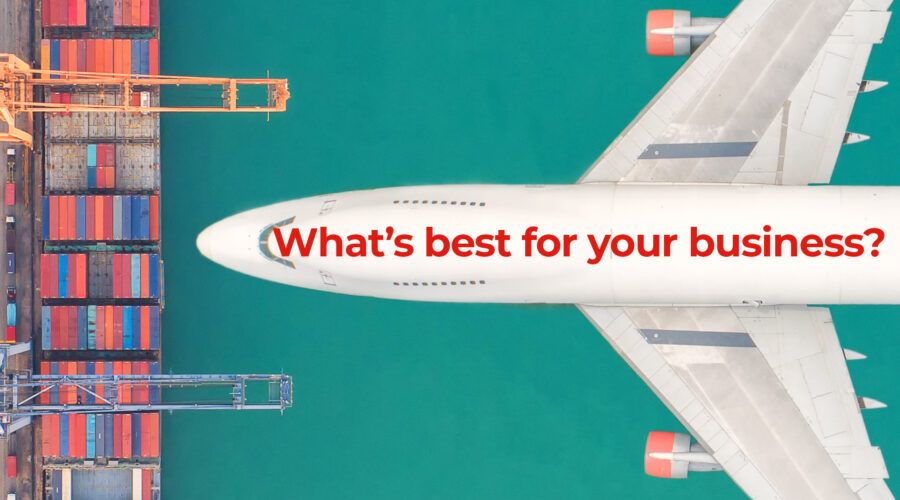
The Waller Transport worldwide guide to sea and air freight
You may know us for our exceptional UK road haulage network, but we’re increasingly providing import and export services around the world via sea and air freight.
In today’s increasingly globalised world, it’s no surprise firms across the UK are importing and exporting to countries worldwide. For almost 60 years, we’ve been revolutionising the transport industry, and we continue to make waves with our European and Worldwide freight services.
But how do you know which option is right for you? Does it just come down to cost, or are more factors at play?
Let’s find out more about our sea freight and air freight services.
What is sea freight?
Sea freight services are where your goods are imported or exported via dedicated cargo ships. Typically, these vessels can contain up to 18,000 containers and can be exported to almost anywhere in the world.
Why is sea freight used?
Sea freight can be an environmentally friendly option. As more companies engage in sustainable business practices, finding new ways to lower their carbon footprint is becoming essential.
It’s also a cost-effective method of importing and exporting goods. In addition, due to the size of the vessels, sea freight is ideally designed for large or heavy goods that are otherwise difficult to move.
However, sea freight can be time-consuming. Typically, you can expect a 38-day turnaround for goods to China or a 14–21-day turnaround for goods to the United States. This means sea freight is a better option for those with longer lead times.
How does sea freight work when it comes to imports and exports?
Sea freight offers a flexible solution that works in several different ways. The most popular options are FCL (known as Full container load) or LCL (Less than container load).
FCL sea freight is where you purchase a full container load to be added to the ship. As you might imagine, it’s a cost-effective way of making the most of your space.
In contrast, LCL sea freight is where you share a container with someone else. This is typically used when you do not have enough imports or exports to fill an entire container. Again, this is a cost-effective and environmentally friendly model.
If you are exporting or importing to Europe, you may prefer a RORO (known as Roll on Roll off) model of sea freight. This is where you simply drive your vehicle straight onto the ship, ready to drive off when you arrive at your preferred port.
What is air freight?
Simply put, air freight is when you need a time-efficient form of transportation to carry your goods around the world. Air cargo typically uses the same routes as passenger air travel, so you can easily import or export goods in a matter of days.
Why are air freight options used?
Air freight is commonly used when time is of the essence. It offers a quick and easy transportation solution and intensive security screenings. It also has the advantage of offering temperature-controlled shipping solutions.
However, it can be expensive, so it is better suited for businesses requiring fast global shipping.
How does air freight work
Air freight can be sent via any airline and used via passenger transport and charter jets. However, the process can be intensive; as well as the electronic air waybill information, detailed information needs to be provided for the truck number (and type) to arrange the onward transportation upon its arrival at the destination airport.
Sending very small goods abroad
Did you know you can hire a courier to take your goods in carry-on luggage by air? Not a bad gig! This is especially useful if you have a spare part needed urgently.
How to decide if sea freight or air freight is right for you?
Choosing between sea and air freight will depend on what you import or export.
The size and weight of the item, as well as your required delivery timescales and budgetary needs, will all impact your chosen international freight decision. Beyond this, you may also need to consider security clearances, onward logistics, temperature requirements or even ramp transportation to decide whether sea freight or air freight is better for you.
It’s also essential to think about your incoterms
When you ship an item abroad from the UK, you will also need to consider your incoterms. These are a set of terms and rules that determine the responsibilities of the buyer and seller in terms of shipping and delivery of goods during an international transaction.
There are eleven incoterms in total. Here at Waller Transport Services, we can arrange complete end-to-end management of your shipments, including making it clear what your responsibilities are, and what your buyer is responsible for.
Why choose Waller Transport for your sea freight or air freight needs?
At Waller Transport Services, we are best placed to support you as you ship or receive goods worldwide. Our expertise lies in helping UK firms to expand their businesses abroad. We can offer consultancy support to help you decide what freight option is best for you, and we can plan and manage every single consignment on your behalf.
We offer a complete end-to-end service for your haulage needs, and thanks to our network of contacts around the world, we can offer you better cost efficiencies. So whether you are choosing to make the most of LCL sea freight or need a multimodal freight service that combines road haulage with sea or air freight, our expert team is here to help.
We can even help you with your customs paperwork and security screenings, finding new ways to make your shipping needs a seamless experience.
To find out more about how we can support your business, please contact us.
